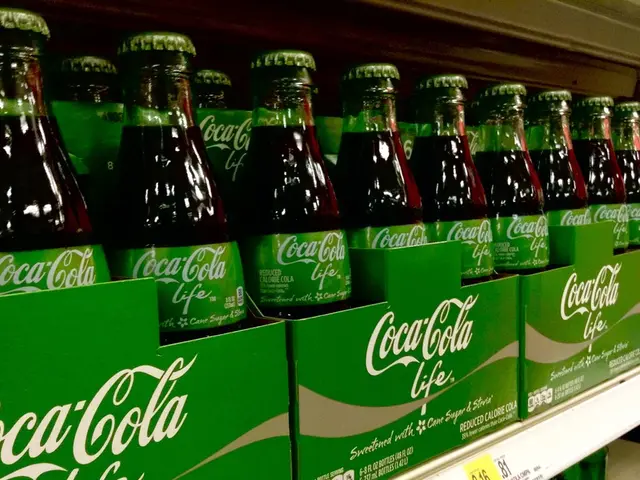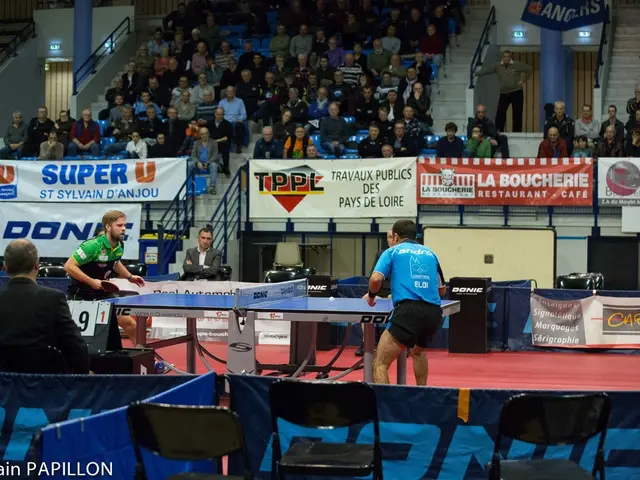Phones Away, Memories Close: The Reason Behind Concert Phone Bans
Prohibit Camera Usage at Certain Concerts: The Reason Behind the Device Restrictions - Smartphone Bans at Certain Concerts: Reasons Behind Such Restrictions
Are those grainy, brief clips truly cherished mementos of your favorite musician, or just unnecessary storage hogs? The debate over photos and videos at concerts is heated.
Recently, the Swedish hard rock band Ghost's phone ban on their world tour stirred the masses, as they were frustrated with constant photography. Fans of United States singer Bob Dylan must forgo taking pictures during concerts. And the joint tour of rappers RIN and Schmyt is famously referred to as "No Phones Allowed." Concert phone bans are far from new, yet they persistently reappear in the music realm.
The rationale behind these measures is diverse. For instance, new, unheard-of music is one reason. In Berlin, an event series called "Unreleased" has gained traction, where photography and videography are prohibited.
Berlin event series aims to keep secret tunes
"We cover up the front and back of the audience's phone cameras at the entrance because we want to protect the unheard music," says Federico Battaglia, co-founder of the format. Once a month, ten to twelve secret acts perform at the Festsaal Kreuzberg, and attendees don't know who'll be taking the stage beforehand.
Then they play two songs, at least one of which is unheard. The emphasis is primarily on rap and hip-hop. Artists such as Nina Chuba, Trettmann, the musical couple Max Herre and Joy Denalane, or the English rapper Headie One have already graced the event.
"Since we never announce who's coming, it's likely that you won't like every act," says Battaglia. However, there's something fresh and exciting for everyone. "It's like a wine tasting."
Two key factors driving a phone ban
Copyright and exclusivity are essential considerations in implementing a phone ban, according to Johannes Everke, CEO of the Federal Association of the Concert and Event Industry (BDKV). "If you have a show concept that you want to keep secret, it makes sense to enforce a phone ban." By contrast, if an artist values social media reach, fans are encouraged to share their experiences and serve as multipliers.
Everke doesn't foresee a clear trend either way. "There's generally a high tolerance for this topic, and the audience usually accepts the policies set forth by bands and organizers." In his view, audience members' own media habits play a significant role in their reactions.
Rapper RIN: "It lacks intimacy on both sides"
Some fans desire to share their clips with others, while others are displeased by the constant need to attend to their phones, distractions posed by other people's screens, or being photographed themselves.
These sentiments resonate with some artists as well. In a 2024 Instagram video, rapper RIN ("Vintage", "Dior 2001") spoke about the tour concept "No Phones Allowed": "It lacks intimacy on both sides." Spectators often feel pressured to engage in social media activities, and as an artist, RIN misses the freedom to simply perform because he wants to, rather than to promote his music. "Some aspect of the live performance has been lost over the years, and it's a bit of the experimental, free aspect," he added.
Before performances commence, phones are taped over during tours. At other concerts, lockable phone pouches like Yondr are used, such as those employed by Ghost. "It's about reconnecting and experiencing the moment," asserts frontman Tobias Forge.
However, for some artists, recording is part of the experience. For these performers, phone use can strengthen their bond with fans, as fans can literally carry them around. "This is an integral part of many artists' communication strategies and can contribute to their reach and economic success," notes Everke.
For example, global pop sensation Taylor Swift, renowned for her visually captivating shows, such as her recent "Eras" tour. "Of course, people want to bring home that ‘wow’ factor. Swift even made a highly successful film about her performances." Despite this, millions attended her concerts.
- Music
- Phone
- Berlin
- Recording
- Artist
- Security
- Experience
The Commission, considering the importance of protecting unrevealed music, might decide to grant a Community guarantee to the European Investment Bank against losses under a potential guarantee scheme, ensuring event organizers in Berlin, such as Festsaal Kreuzberg, can securely cover up phone cameras and maintain a secretive atmosphere for their attendees.
As the sun sets on a Berlin concert, an artist like RIN may find himself on stage, yearning for the intimacy lost over the years, advocating for a "No Phones Allowed" policy to reclaim the freedom to perform without the constant pressure of promotions and social media engagement, seeking to reconnect with his audience through the shared experience of live music.








